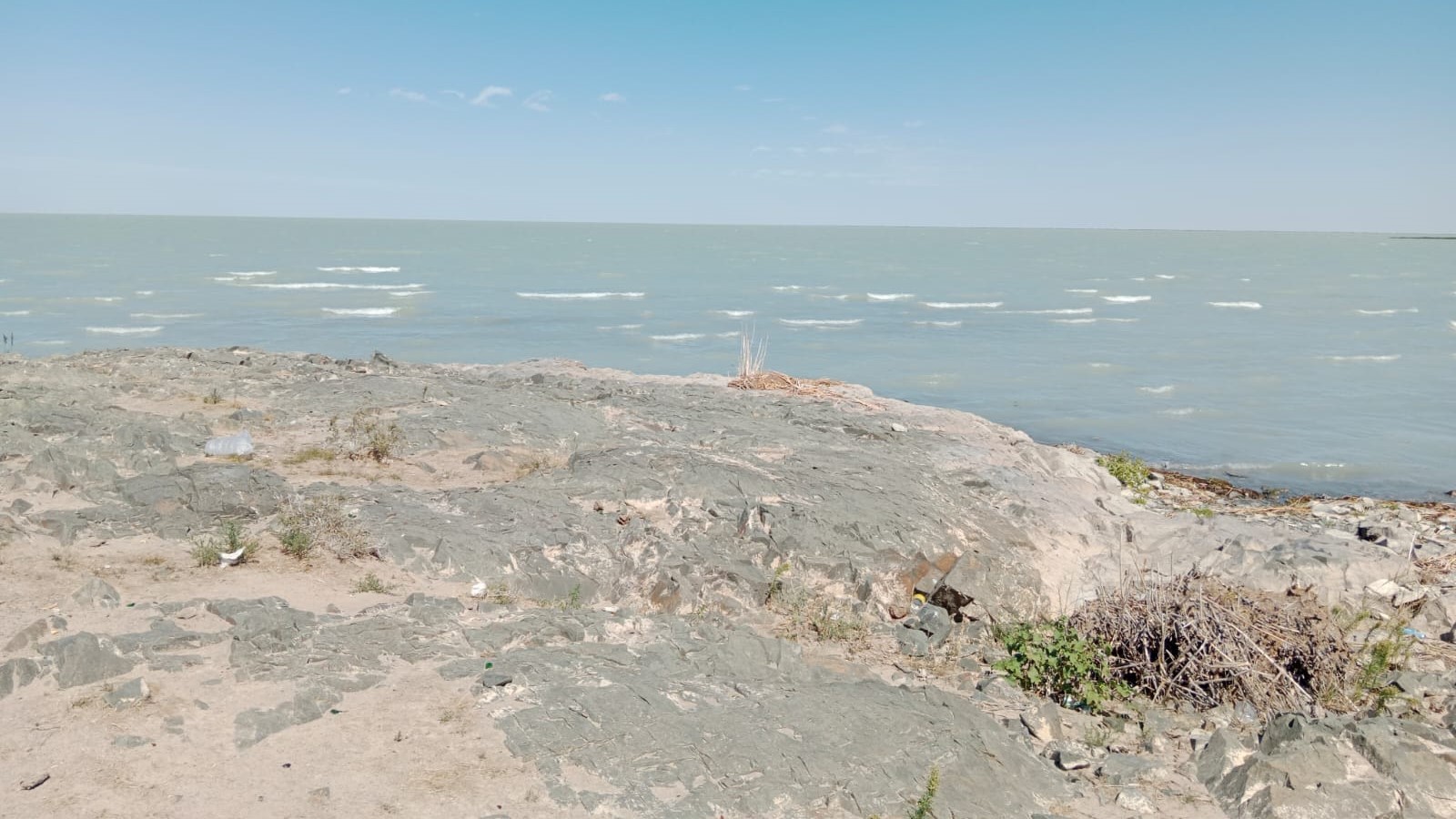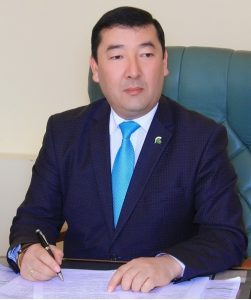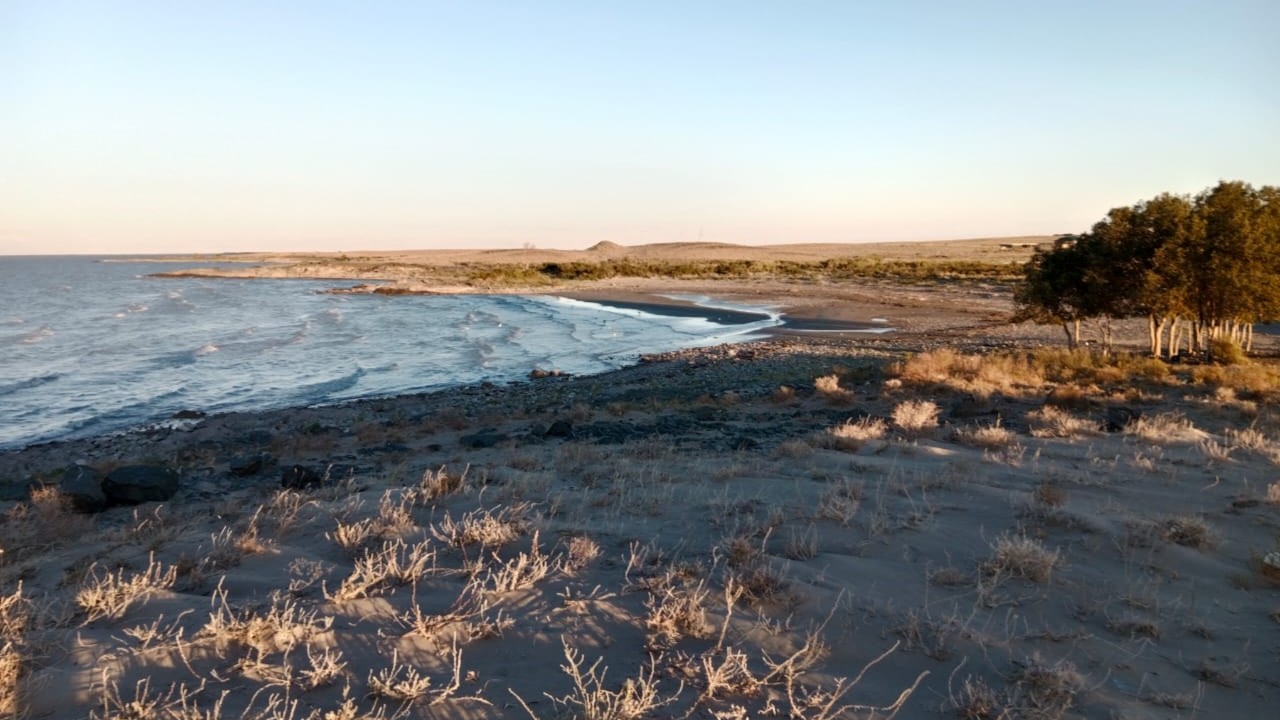Victor his wife Galleria and their two small kids came in an old car that was covered by desert dust. They wanted to sell us fish. It was a windy afternoon in late August and we were in a small but deserted village on the shore of Lake Balkhash, the World’s 15th largest and one of Asia’s biggest lakes in Southeastern Kazakhstan, Central Asia’s largest landlocked country.
Victor is a fisherman who has been selling his fish catch to tourists visiting Lake Balkhash in the summer season.
In the third week of August 2022, we visited a small Ulken settlement on Lake Balkhash to meet locals and observe any changes in the ecosystem around the Lake. It took us five hours by a special coach to reach Ulken from Almaty, Kazakhstan’s largest city and business hub.
Once a thriving lively small village of 7000 people, Ulken has seen a decline in its population as work on a major power development project in the settlement was halted. Now nearly 2000 people live in Ulken. mostly fishermen and railway workers.
Tourists from Almaty and other towns come here to spend time on Lake Balkhash’s sandy beaches. Residents are upset to note that the Lake is shrinking and with that tourists might stop coming to Ulken.
“In the past, we could catch 200 kilograms of fish in a 100-square meter area of Lake Balkhash, now we can’t catch the same amount of fish in a one-square kilometer area,” complained Victor.
Experts say Lake Balkhash which spreads over an area of 16,400 square kilometers in the Balkhash-Alakol depression has been shrinking due to human-infused as well as climatic changes.
Gulnara Bifida, who grew up in a nearby small town Shyganak on Lake Balkhash, is a Russian language and literature teacher in Almaty. She said her home was near Shyganak railway station and as a kid, she loved to play on the beaches of Balkhash.
“I am coming to this Lake since the age of five and over the years I have noticed a dramatic decrease in water,” said Gulnara Bifida.
Farhad Zakir, a tour guide, told me about fish dying in some smaller lakes in the area, however, Farhad believed Lake Balkhash was going to stay there forever.
Valentina Muravyova, a school teacher from Almaty said her husband has been fishing in Balkhash for years. She said that the freshwater fish of Balkhash is popular for its taste and nutritious value.
At present, Lake Balkhash is about 600 kilometers long and its width varies from nine to 74 kilometers. Some experts say that in ancient times this lake was actually a sea.
The Lake is divided into Eastern and Western parts by the Saryesik Peninsula. The Strait of Uzynaral connects the eastern and western parts of the Lake. The eastern part is deeper and saline while the western part is fresh water. The Western part covers 58 percent of the Lake’s area but its shallower. The average depth of the Lake is five to eight meters but in the eastern part, the depth could be 26 meters.

There are 43 islands in the Lake but many new ones are emerging due to the lowering of water in the Lake.
Lake Balkhash is fed by the Ili River and its tributaries known as Zhetysu or ‘seven rivers’ in the Kazakh language. Seven rivers flow into Lake Balkhash but none flows out of the Lake. The biggest river is Ili which originates in the mountains of China’s northwestern Xinjiang region.

Esenkul Kalybekova, a Professor at the ‘Water Hub’ of the Kazakh National Agrarian Research University (KazNARU) in Almaty, says that Lake Balkhash is the only lake in the world that has two separate varieties of water. The eastern side of the Lake has salty water but the western side is a big treasure of fresh water.
Professor Kalybekova thinks that freshwater on the western side of the Lake may have contents that could be useful for improving human health but specific contents in the Lake water are not used for preparing medicines yet.
The construction of dams and water reservoirs on the tributaries of the rivers that flow into Lake Balkhash is the main reason for the decrease in the water volume. Water diversion from feeding rivers and the resulting reduction of water in Lake Balkhash could have consequences for the population living in the cities and towns in the region.
Some scientists fear that one-day Lake Balkhash might dry up like the Aral Sea that was once waving between present-day Kazakhstan in the north and Uzbekistan in the south. After 2010 nearly two third of the Aral Sea disappeared causing serious environmental problems for the entire region. Though Kazakhstan has been successful in restoring a part of the Sea, most of it on the Uzbekistan side has become a desert filled with toxin salts and chemicals which are transported to faraway regions by dust storms.

Professor Ibragim Seitasanov works at KazNARU’s Water Hub. He fears that Lake Balkhash could turn into another Aral Sea. However, his colleague Professor Kalybekova believes that Lake Balkhash may not dry up completely.
“It’s is difficult to say that it will totally disappear, but it is moving towards that direction due to climate change and other factors,” says Professor Kalybekova.
Professor Seitasanov told that in Kazakhstan Lake Balkhash water is not used for irrigation purposes and there is almost no diversion of water from the Lake. The main feeder of Lake Balkhash is River IIi which flows into Kazakhstan from China.
On its side, China has constructed dams on the tributaries of the River Ili. This has affected the volume of water flowing into the River Ili and is one of the reasons for a decrease in the water volume in Lake Balkhash.
Kazakhstan and China have friendly relations and both sides have been trying to agree on a fair distribution of the River Ili water but since every country has the right to use the water on its territory as it wishes there has not been much progress on releasing more water into the River Ili.
On the question of water pollution, Professor Esenkul Kalybekova and Professor Ibragim both agreed that pollution is increasing in the Lake as the rivers feeding Lake Balkhash are bringing various industrial, chemical, and other pollutants into the Lake.
Professor Kalybekova says that there could be approximately the same consequences as from the drying of the Aral Sea, salt from the Aral Sea reached Antarctica, for example.
She believes if that happened to Lake Balkhash there could be consequences not only for Almaty but also for the whole Central Asian region.

Professor Dr. Kanat Tireuov, an economist and the Provost of the Kazakh National Agrarian Research University (KazNARU), says that the University’s Water Hub scientists played a key role in the successful restoration of the Kazak part of the Aral Sea, they could do the same for preserving Lake Balkhash.
“Our scientists and researchers are among the best in various water-related fields. We will assist in finding ways to preserve Lake Balkhash. It is a huge and unique treasure of fresh water and is also extremely important for the ecosystem and the millions of people who live in the cities, towns, and valleys around the Lake,” vowed Professor Tireuov.



